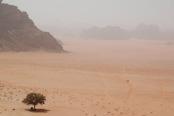
Story highlights
- Consequences of climate change especially acute in the Arab world
- Traditional coping methods severely stressed by current rate of climate change
- Climate change will have far reaching impacts, but some groups more vulnerable
The year 2010 was globally the warmest since records began in the late 1800s, with 19 countries setting new national temperature highs. Five of these were Arab countries, including Kuwait, which set a new record at 52.6 °C in 2010, only to be followed by 53.5 °C in 2011.
According to a new report, Adaptation to a Changing Climate in the Arab Countries, extreme weather events are the new norm for the region. The consequences of the global phenomenon of climate change are especially acute in the Arab world. While the region has been adapting to changes in rainfall and temperature for thousands of years, the speed with which the climate is now changing has, in many cases, outstripped traditional coping mechanisms.
“Climate change is a reality for people in Arab countries,” said Inger Andersen, World Bank Vice President for the Middle East and North Africa region. “It affects everyone – especially the poor who are least able to adapt – and as the climate becomes ever more extreme, so will its impacts on people’s livelihoods and wellbeing. The time to take action at both the national and regional level in order to increase climate resilience is now.”
The report draws on extensive regional knowledge and expertise for a comprehensive analysis of the potential impact of climate change. Temperatures are projected to reach new highs, and in most places there will be less rainfall. Water availability will be reduced, and with a growing population, the already water-scarce region may not have sufficient supplies to irrigate crops, support industry, or provide drinking water.
This will put the livelihoods of men and women at potential risk from climate change. Each has different vulnerabilities largely based on their respective roles in society. Men in rural areas are likely to follow current trends of moving to cities to seek paid employment, as their traditional livelihoods become unsustainable. Rural women will face the double challenge of having to devote more time to daily activities, such as fetching scarce water, while assuming the farming and community responsibilities of the absent men.
Left unaddressed, these changes in the family structure have the potential of becoming significant sources of stress. Actions taken to help both men and women understand and adapt to these changes at the household level are an important part of the possible policy responses. Women especially, with their pivotal role in societies, can be a major influence on the attitudes and behavior needed to accommodate new forms of livelihood and social organization.
“Reducing vulnerability to climate change will require concerted action on multiple levels,” said Rachel Kyte, World Bank Vice President for Sustainable Development, who launched the report today at the UN Climate Conference in Doha, Qatar. “Leadership will be critical in developing the consensus to make this possible and establish climate change as a national and regional priority.”
Fortunately, Arab countries can take steps to reduce the impacts of climate change. The report outlines measures that not only potentially reduce the region’s vulnerability, but can also contribute to more sustainable long-term development. The report offers a model, an ‘Adaptation Pyramid Framework,’ to strengthen public sector management in a changing climate, and to assist stakeholders in integrating climate risks and opportunities into all development activities. The main messages suggest that countries and households will need to diversify their production and income generation, integrate adaptation into all policy making and activities, and ensure a sustained national commitment to address the social, economic and environmental consequences. With these coordinated efforts the Arab world will be able to rise to the challenge once again and, as it has for centuries, successfully adapt to a changing climate.